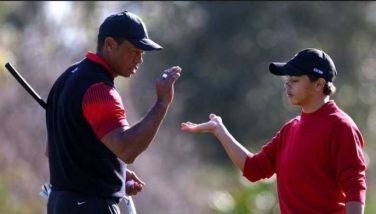It took a pair of so-called BraSyrians to thwart the San Miguel Beer-Philippine team’s bid for a finals berth at the FIBA-Asia Champions Cup in Tehran last Saturday.
Al Jalaa Aleppo of Syria recruited not two but three BraSyrians to back up imports Bernard Jons and Julius Nwosu in a heavily reinforced roster.
Syria crushed the Philippines twice in the nine-day joust. The first meeting came in the elimination round with Syria taking a 114-80 decision. In the semifinals, Syria blasted the Philippines again, 109-77. A win by the Philippines in the rematch would’ve sent coach Chot Reyes’ charges into the finals.
Syria’s coach was American John Sneed who once called the shots for the California State at Fullerton varsity. Al Jalaa wound up second after losing to host Saba Battery in the championship game last Sunday. The Philippines finished fourth, its best finish in the tournament since winning the crown in 1996.
The BraSyrian guns-for-hire were 6-3 Eduardo Caviglia (renamed Farhat), 6-5 Andre Luiz Chueri da Silva “Dede” Barbosa and 6-9 Marcelo de Andrade Correa. They claim Syrian heritage and will likely play for the national squad at the FIBA-Asia Championships in Tokushima this July.
Correa, 30, saw action for San Diego State, an NCAA Division I school, in 1997-2001. His father Roberto is supposed to be Syrian and was a Brazilian national cager. His mother Lucia Helena is Brazilian.
Caviglia, 30, played for West Texas A&M and his father purportedly migrated from Syria to Brazil over 30 years ago. Caviglia has dropped his surname and is now known as Farhat which definitely sounds more Syrian.
“Dede,” 27, might even be related to the Phoenix Suns’ Leandrinho (The Brazilian Blur) Barbosa, who was named the NBA’s Sixth Man awardee this season. To allay suspicions, “Dede” now uses Chueri as a last name. Who knows? Maybe the Phoenix star might show up in a Syrian uniform in Tokushima as another BraSyrian.
Caviglia and Barbosa inflicted a lot of damage on the Philippines in the second encounter. They combined for 38 points and were two of four Syrian scorers in double figures. Correa was not a factor.
Under FIBA rules, a national team may suit up only one naturalized player. But there is no restriction on the number of dual citizens in a roster. The presumption is dual citizens are not naturalized but legitimate nationals. That’s why the Philippines is able to enlist Danny Seigle, Asi Taulava, Mick Pennisi and Tony de la Cruz for the national squad. That’s the same rule Syria has invoked in tapping the three BraSyrians.
The question is – are the three BraSyrians legitimate? Do they really trace their roots to Syria? What is the probability of finding three professional Brazilian basketball players, unrelated to each other, with Syrian lineage?
More and more, there are reports coming out that poor African athletes are being sold wholesale to West Asian or Middle East countries for “conversion” not as naturalized citizens but as “origin” players or those eligible for dual citizenship because of heritage.
Like other countries, the Philippines is entitled to recruit one naturalized player – a foreigner who goes through the immigration process of acquiring Filipino citizenship. As an example, Alex Compton would be eligible to play for the Philippines if he took out Filipino citizenship. It’s the same case with La Salle cager Marko Batricevic of Serbia. There is no residence rule for naturalization in FIBA, meaning a foreigner may be brought in and given instant citizenship to become eligible as a national player. Theoretically, a James Penny or a Marquin Chandler could play for the Philippines if he becomes a naturalized citizen. The limitation is only one naturalized player is allowed per national team.
Hakeem Olajuwon of Nigeria was given instant citizenship to play for the US as a naturalized citizen in the 1996 Olympics, exempted from the then-FIBA rule requiring a three-year prior notice. Olajuwon wasn’t the only foreigner naturalized to play for the US. Others included Panama’s Rolando Blackman and Jamaica’s Pat Ewing. FIBA previously allowed two naturalized players per country which is how Jeff Moore and Dennis Still played for the Philippines in the 1985 Asian Basketball Confederation championships.
In the Doha Asian Games last year, Japan brought in a naturalized player Eric McArthur of the University of California at Santa Barbara. Colorado State’s Joe Vogel, once drafted by the Seattle SuperSonics, has been a mainstay on Lebanon’s national team as a naturalized player for years. To add more sock to its lineup, Lebanon took in Tongan Paul Afeaki (renamed Khouri) and Brian Beshara (renamed Feghali) as “origin” players. Afeaki played for the University of Utah and Beshara, Louisiana State University in the US NCAA.
Recruiting fakes or mercenaries to beef up national teams is so rampant that it makes you wonder if there is still meaning to patriotism and the integrity of the game.




























